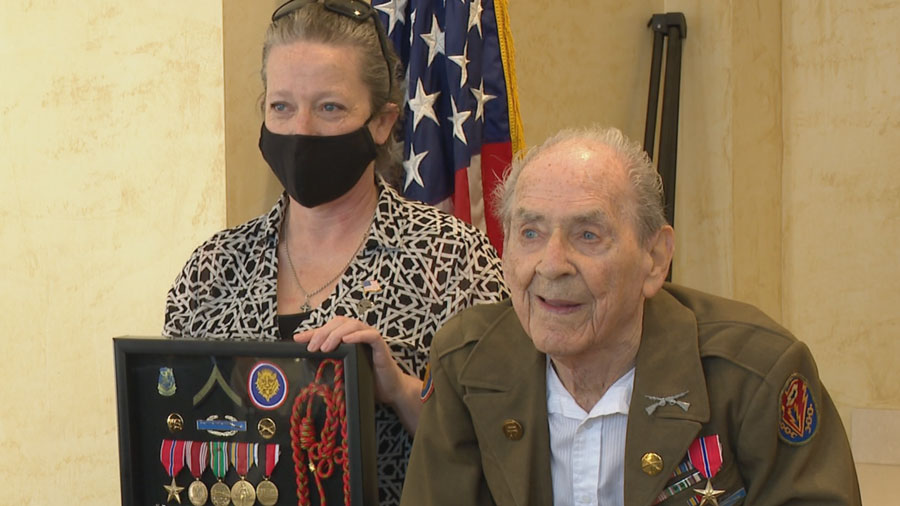By Donald Lachman and Andrea Talmadge – WestCare Washington
According to the Department of Veterans Affairs, around 400 of the remaining 400,000 World War II Veterans die every day. By the year 2036, it’s estimated that there will be no living Veterans from that war left to recount their experiences, which is why it’s important to honor them while we can.
WWII Veteran, U.S. Army Private First Class, Robert H. Shields, is among that remaining band of brothers as a member of the U.S. Army’s 106th Infantry Division, the 424th Regiment’s “H” Company. Unfortunately, on December 16, 1944, Robert and his fellow soldiers were about to make history. When the Battle of the Bulge opened at 0530 hours, Robert and his unit were ordered to block and slow down the advance of an armored juggernaut, Germany’s 5th Panzer Army!

This historic battle was the final major German offensive campaign on the Western Front during WWII. Launched in a thickly forested region in Belgium, it was intended to tear open the Allied lines, allowing the Germans to encircle and destroy four allied armies and force the Western allies to negotiate a peace treaty.
We could hear those big German tanks roaring and moving around,” said PFC Shields, 95, recalling his World War II experience as if it happened yesterday. “I knew they were going to be attacking and sure enough, they did. The whole German line attacked,” recalled PFC Shields. “We held out to the last. I was pumping mortar shells out there.” “There were busted trees all over and splinters flying away.
– PFC Shields

By repeatedly delivering accurate mortar fire into the advancing enemy, PFC Shields repelled several enemy attacks on December 16th. The following day, the enemy scored direct hits on the sections mortars as well as the section leader, but PFC Shields led a team that remained in position and provided mortar and small arms fire throughout the battle. On December 17th, the 424th Regiment made a successful withdrawal to St. Vith, Belgium. Shields and his fellow infantry members of the 424th were later awarded the Bronze Star as a unit.
Circumstances changed for Robert when his niece, Mary Prophit, a rural librarian and combat Veteran, participated in a formal service collaboration hosted by WestCare Washington/WAServes. Mary joined a leadership team that successfully established the inaugural model teleservices program offered at rural libraries called the Veterans Connection Café, VCC. During this experience, Mary saw firsthand the power and connections that Veteran Services Officers (VSO) like Gary Walker with the Lacy American Legion Post 94 have in connecting benefits and resources exclusively available to Veterans. She also discovered the reach that Veteran organizations possess with fellow service officers across the country. Gary helped Robert obtain long overdue benefits from the VA including hearing aids and glasses as well as help organize the awards ceremony with colleagues in Grand Rapids, Michigan.
I knew that I was awarded [The Bronze Star Medal] but I never got it. I thought, if I tried to call the United States Army in Washington DC about a medal that was given in 1944, whoever I would be talking to would hang up, you know.”

On Friday, March 12, 2021, at 11:00 a.m., a current officer serving in the U.S. Army, along with many of PFC Shields’ family members and friends, gathered at the St. Stephen Catholic Church to support him as he finally received his Bronze Star Medal. The Army officer read PFC Shields’ citation and pinned the Bronze Star on him.
Mary flew in from Washington State to be present for her uncle’s long overdue ceremony and recognition. “If you read the citation of what he did and what he endured to earn this, it’s remarkable,” Mary said. “For him to be able to be recognized, it means the world to me.”




